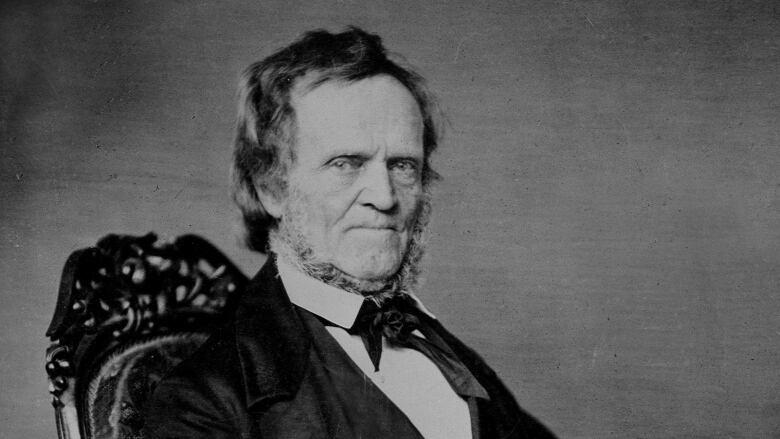Bell Media's principles of business and media collide: Don Pittis
If you own a media outlet, do you get to say who gets quoted?

If William Lyon Mackenzie is watching from heaven he's mad as hell.
"One thing is certain," wrote Mackenzie in the 1820s in his newspaper blasting the financial power ofUpper Canada's family compact and their tame newspapers, "No free popular government can exist unless the people are informed."
The names and positions may have changed, but the issue has not gone away. The latest example, according to a report in yesterday'sGlobe and Mail, is an unsubtleattempt by the owners of a media outlet to change the way its reporters reported the news.
- Bell Media president Kevin Crull apologizes for 'intrusion' into CTV's CRTC coverage
- CRTCblasts Bell for alleged meddling in CTV News coverage
This time the media organization is the hugely influential CTV News, and according to the Globe's media reporter James Bradshaw, the one trying to influence the news was the president of Bell Media, Kevin Crull, who apparently instructed CTV president Wendy Freeman to bar the head of broadcast regulator CRTC, Jean-Pierre Blais, from appearingon the network.
Blaishimself was justifiably outraged, and Krull has since apologized for his "intrusion" into the news operations.
Undue interference
"One of the pillars of Canada's broadcasting system and, in fact, our country's democracy," said Blais in a statement yesterday, "is that journalists are able to report news stories independently and without undue editorial interference."
According to John Sewell'sbook on the subject, Mackenzie's papers never made him much money, except when he successfully sued members of the ruling families for breaking into his house and throwing his printing equipment into the lake. Talk about undue editorial interference.
Anyone who has worked in the media knows there is always influence from above. And public broadcasters are not exempt. When I worked for Radio Hong Kong decades ago, I remember a late-night call from atopcivil servant telling me not to continue reporting on a leading public official.
Since I was alone on the desk that night, writing and reading the radionewscasts, I was free to ignore his advice. I was young and brave enough to accept the consequences. (I never heard any more about it.)
Certainly the CBC was conflicted over its coverage of the Jian Ghomeshistory, and management eventually addressed the problem by standing aside while our most credibleinvestigators, includingAs It Happensandthefifth estate, interviewed key managers involved in the decision making a process that was not painless.
Business ownership
But in the ownership of media outlets by large powerful businesses there is a special conflict and therefore a special responsibility.
"Freedom of the press is guaranteed only to those who own one," said A.J. Liebling ina wonderful column,"Do you belong in journalism?" in the New Yorkerin May1960, worrying about the undue influenceof powerful business media groups. He said that even profitable papers were selling themselves to competitors.
"American cities with competing newspapers will soon be as rare as those with two telephone systems,"said Liebling. It was fascinating reading that line on the day that Canada's Competition Bureau approved the merger of Postmedia and Sun Media, two of the country's few media chains.
In 1960,Liebling had never heard of "convergence," that dot-com era ideathat saw newspapers, television and telecommunications all growing together into one big business conglomerate. But even by then, the media business had expanded into something completely different from what it had been inMackenzie's day, when having a printing press was enough.
"Anybody who owns the price of anewspaper nowadays must be a businessman," observed Liebling.
Multiple voices
In some way we may be returning to an era of multiple news sources, as outlets like Jesse Brown'sCanadaland weigh in on subjects others would like to ignore. But as Brown has admitted himself, it is hard to play with the big boys when you don't have the resources to fight a lawsuit.
The trouble with businesses owning news organizationsis that in many waysthe basic principles of business arein directconflict with those of the media. Business is purely self-interested, with the financial bottom line and shareholder value coming first. Business, especially big business, tends to be top-down with the boss making crucial decisions of policy and practice. Media tendto operate from the ground up.
Of course, the owners of media groups have always had subtle power, usually enacted throughthe ability to hire people with the "right" sort of values. In the U.K., that is why Conrad Black's Telegraph tended to take a Conservative spin on the news, whileRobert Maxwell's Mirror took a Labour view.
But ham-handed manipulation by corporate managers is actually bad for business. A glance at the comments section on almost any story shows an almost paranoid fear that shadowy figures are manipulating the news, and that reporters are mere puppets. Examples of corporate masters actually doing the deedis shattering for an organization's credibility. People will ask, "How many times has it happened when we did not hear about it?"
Alternative advantage
As the power of business ownershipgrows and consolidates, in some ways it is a reminder to the Harper government of the value of having a public broadcasterstrong enough to present an alternative view.
According to Bradshaw'sreport, some people at CTV News caved in to the pressure from on high. That is not unreasonable in an era when the number of media jobs is shrinking.
But others, including senior journalists Robert Fife and Lisa LaFlamme, rebelled against the rulingon principle. That is what used to be called "character." A salute too, to the Globe and Mail that did the right thing in reporting the storydespite its own minority ownership stake by Bell.
Of them, William Lyon Mackenzie would have been proud.












_(720p).jpg)


 OFFICIAL HD MUSIC VIDEO.jpg)
.jpg)



























































































